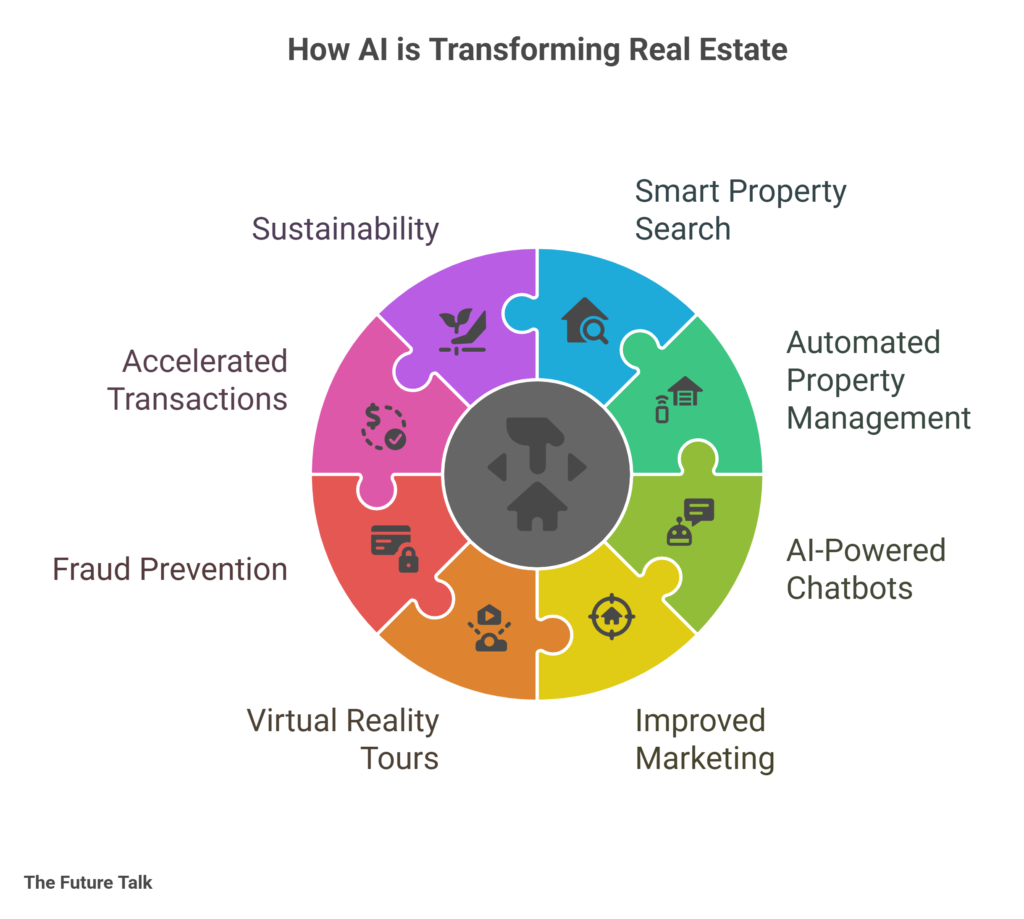
AI in real estate is considered one of the biggest booms as it can transform the industry by analyzing vast amounts of data, optimizing processes, and predicting trends. Since the real estate industry relied heavily on manual processes, AI holds immense potential.
According to Maximize Market Research, AI in real estate is projected to hit the staggering US$ 1335.89 Billion mark by 2029, with a CAGR of 35% during the forecast period of 2022-2029.
AI presents an opportunity for the real estate industry to learn from its past and harness the power of cutting-edge technology. Considering a McKinsey Global Institute (MGI) report, generative AI could generate US$ 110 billion to US$ 180 billion or more in value for the real estate industry.
This article explores how AI is a transformative force beyond just a trend, promising to redefine the real estate sector in the coming years.
AI in Real Estate To Drive Innovation
AI in real estate can present a lot of opportunities, including AI tools that can redefine property risk analytics and valuations for appraisers, property recommendations, market analysis and customer experience automations for buyers, and selections of construction sites for home builders.
According to the New Delta Media Survey, 75% of America’s leading real estate brokerages have already adopted AI.

AI is transforming the real estate industry in numerous ways:
Property Valuation and Cost Prediction: AI models help real estate businesses with the analysis of historical data, market trends, and property attributes to provide accurate property valuations. Companies like Zillow leverage AI-powered tools like Zestimate to estimate home values.
Predictive Analytics for Investment Decisions: AI tools have the ability to evaluate location-based data, economic indicators, demographics, and historical trends to predict the best locations for real estate investment. AI helps investors and real estate developers in identifying high-growth areas and potential rental yields.
Personalized Customer Experiences: AI-powered chatbots and virtual assistants understand customer preferences, providing personalized interactions on specific property information. These AI tools also offer recommendations, and scheduling capabilities, ensuring an enjoyable property search experience for customers.
Automated Property Management: AI in real estate automates tenant screening, maintenance requests, lease renewals, and rent collection. For example, smart buildings equipped with AI-enabled IoT sensors optimize energy consumption and spot maintenance issues before they arise.
How Investing in AI in Real Estate Brings Greater ROI?
AI in real estate is in its infancy as most companies in this space are in the early stage of integrating this technology. As AI has already introduced innovation in diverse industries, it has enormous potential to reshape real estate. In 2023, US$ 630 million has been invested into AI-powered PropTech.
Investing in AI technologies helps investors make data-driven decisions on buying and selling properties. They can even optimize property valuation and pricing. AI-powered ad targeting allows real estate firms to reach the right audience, improving conversion rates.
Whether through predictive analytics, AI-powered marketing, or smart property management, investing in AI for real estate maximizes ROI. Many believe that AI technologies will reshape real estate by optimizing processes and enhancing customer experiences, while most reported that AI-powered insights have allowed them to make data-driven decisions, address risks and maximize returns on investment.
As technology continues to advance, integrating AI in real estate will be pivotal for driving innovation and shaping the future of the industry. Despite challenges like high initial investment, lack of human intuition, and privacy and ethics concerns, AI solutions perform every task of a realtor. REX Real Estate, Entera, and HouseCanary are some of the companies that are already leveraging AI solutions to redefine the real estate industry.
Also Read: What Are AI Agents? – A Comprehensive Guide
What AI Holds For The Future of Real Estate?
AI holds immense potential for the future of real estate. The use of advanced image and video recognition, voice-activated search and assistance, and proactive building health monitoring systems is considered to be some transformative solutions revolutionizing the industry.
Thus, the integration of AI in real estate offers unprecedented insights and automation for property management and infrastructure development. This technology will be a game-changer, providing businesses with the expertise needed to make the most out of predictive analytics in real estate to stay ahead of market trends.
Stay tuned to The Future Talk for more such interesting topics. Comment your thoughts and join the conversation.